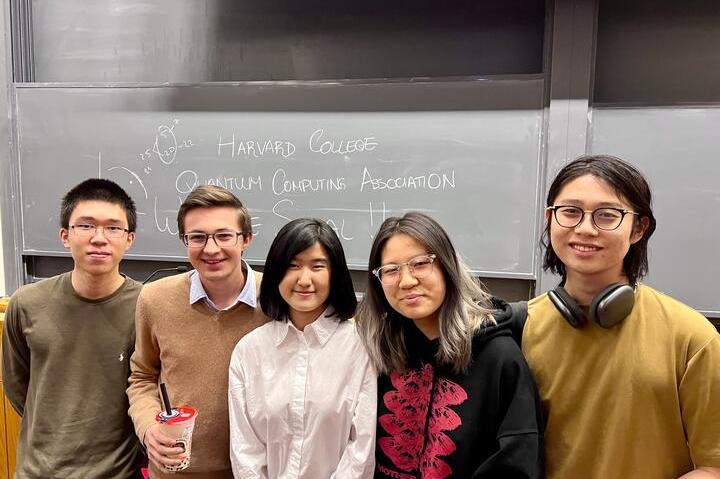
Quantum Clubbing
The visibility of quantum science and computing has increased dramatically at Harvard in recent years. The university launched the Harvard Quantum Initiative in November 2018, and this fall the university welcomed the first cohort of students in its quantum science and engineering Ph.D. program. In September, Harvard announced a partnership with Amazon Web Services to enhance quantum research, development and outreach opportunities on campus.
Students at the Harvard John A. Paulson School of Engineering and Applied Sciences (SEAS) are also leading the way by promoting and expanding access to quantum computing for the undergraduate student body. Emma Yang, A.B. ‘25, has restarted the Harvard College Quantum Computing Association (HCQCA), an undergraduate student organization that became inactive when the pandemic shifted Harvard to remote learning. The group has already recruited more than 150 members, a sign that even students relatively new to campus are interested in the cutting-edge field.
“We were really pleasantly surprised about how many people showed up at our table at the club fair, spoke to us and signed up,” said Yang, a computer science and physics student. “It speaks to how this is a really great year to be getting into quantum computing. We’re really glad that we were able to reach such a broad audience. We have physics concentrators, computer science, math, applied math, chemistry, engineering, and even a couple grad students. We’re really happy about the progress we’ve made.”
Yang, president of the HCQCA, wants the club to be a gateway for students with little to or prior experience to learn about quantum science and computing. The HCQCA held its first meeting ahead of one of the Harvard Quantum Initiative’s weekly graduate-level seminars at the end of September.
Members of the Harvard College Quantum Computing Association attend a seminar
Members of the Harvard College Quantum Computing Association attend a quantum physics graduate seminar at the Jefferson Lab (Emma Yang)
Lectures have already been planned for the fall semester, beginning on October 18 with Robert Westervelt, Mallinckrodt Professor of Applied Physics and of Physics at SEAS and Director of the Science and Technology Center for Integrated Quantum Materials and the Center for Nanoscale Systems. Yang hopes to add programming bootcamps next spring so group members can start to practice quantum computing themselves.
“What really strikes me is how quantum computing really comes at the intersection of so many different fields,” she said. “There are a lot of different professors doing quantum computing research from different angles. We want to give our members a broad exposure to the different kinds of research that’s happening in various departments at Harvard, and also want to bring in diverse perspectives from industry as well as academia. The Harvard-Amazon Web Services partnership that launched a few days ago is just one example of a big company working on quantum computing.”
Yang’s efforts helped restart the club, but the HCQCA has multiple students in its leadership team. Ricardo Skewes Zorrilla, A.B. ‘25, a physics and CS student, is the club’s vice president, and William Hu, A.B. ‘25, is treasurer and director of events. For Skewes, the fusion of his two main academic interests drew him to quantum science, and then to the club.
“To see them combine together in such a way is fascinating, and I would certainly like to spread this to even more undergraduates who might contribute to the field in some way,” Skewes said. “Developments in quantum science have been partially accelerated by industry interests, but they also stem from pure fundamental physics research, which is exciting.”
Madison Davis is one of many first-year students recruited to the HCQCA. Though interested in quantum computing as a high school student, she lacked access to the educational resources that would allow her to pursue the field. Once she discovered the HCQCA, she wanted to be part of it.
“I’m always interested in exploring new things,” Davis said. “What drew me to computer science in general is that it’s like a puzzle and has no dead ends. I prefer to have a field that’s more open-ended, that is going to change, and it felt like quantum computing was so new. I want to learn its capabilities and possibilities.”
Harvard College Quantum Computing Association leaders William Hu, Ricardo Skewes, Emma Yang, Rain Wang and Felix Yeung
Harvard College Quantum Computing Association leaders William Hu, Ricardo Skewes, Emma Yang, Rain Wang and Felix Yeung (Emma Yang)
Susanne Yelin, Professor of Physics in Residence and Vice Director of the Max Planck-Harvard Research Center for Quantum Optics, is the group’s faculty advisor. Yelin said there’s been an interest in quantum science at Harvard for many years, but the interdisciplinary nature of the field is fueling its rapid growth on campus, including the rebirth of the HCQCA.
“The interest was mostly in physics and applied physics before,” Yelin said. “Now, computer science has hired people who are interested in quantum science. Chemistry has hired people who are interested in quantum science. There are also more and more of us who have industry connections.”
Yang considered multiple universities as she was preparing to graduate high school in the spring of 2021. The announcement of the Harvard Quantum Initiative helped convince her to come to Cambridge. Now, she wants to share her passion for the field with her fellow classmates.
“I really want to be able to support younger students who are still acclimating to college and figuring out what they’re interested in, paying that forward and being a resource and support for them,” Yang said. “Being here and being able to experience the breadth and depth of research happening across the board at SEAS, and how much investment and development has happened here, has really affirmed that I made the right choice. The faculty here are all so approachable and open to new ideas and new angles.”
